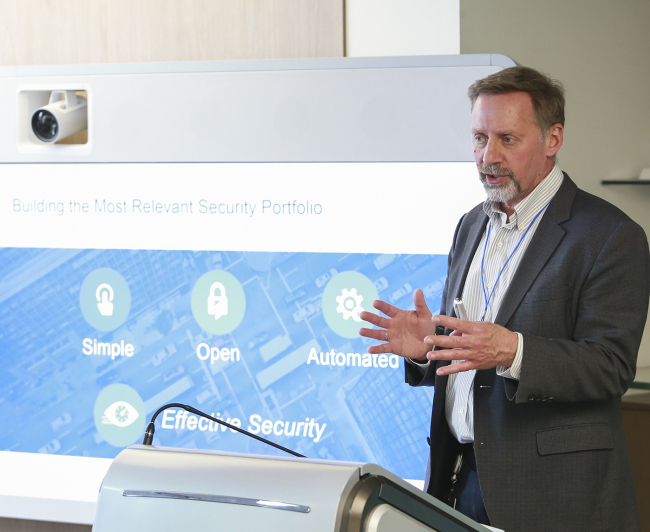Cisco to step up research team for Korea-targeted security threats
By Korea HeraldPublished : March 7, 2017 - 16:32
Bret Hartman, chief technology officer of the security business group of Cisco, Tuesday said his company is in the process of enhancing its research team for security threats, specifically targeting Korean businesses and organizations amid the recently escalating threats to the country.
Cisco has a research team of over 250 experts on information security, data science and hacking, known as Talos, which detects and defends from more than 200 million attacks on a daily basis.
“We do not currently have Talos people here in Korea, but we are looking at that right now,” Hartman said at a press conference during his first visit to Seoul. “Korea has very unique exposure (to security attacks for political intentions) in terms of being surrounded by many countries in the area to have concerns about.”

Such a plan by the top US security solution provider captures market attention, as security threats to Korea, both for political reasons and financial gains, have been spiking recently, including those from China due to the ongoing tension over the establishment of the controversial US Terminal High Altitude Area Defense system on the Korean Peninsula.
The Talos team is currently focusing on Korea as it has recently detected increasing malware attacks tied to a Korean-specific word processor program, he said.
The team visited Seoul twice last year for deployment of its research workforce in the country, too.
“Cisco is currently expanding the Talos team worldwide and is continuing to discuss where it is best to be located,” Hartman said.
The Cisco security chief affirmed that Korea is an important market for expansion of the US company’s security business, as the country is facing what he called “very significant” threats.
A challenge related to attacks on nations is that attackers collect and gather information for a very long period for future use -- which does not directly cause damage -- requiring cooperation from governments in order to share information about those kinds of threats, Hartman said.
“It’s not easy to assess that risk because there is collection of intellectual property and private data,” he said. “I met with officials from a Korean security authority yesterday and discussed measures to increase the partnership between Cisco and the Korean government on sharing threat information.”
Security threats are global, since a threat that emerges in Korea usually ends up in another country as well, according to the CTO.
“A critical issue here (is) to have good feasibility plus many organizations, being able to see what’s going on and to share threat information between different countries, not just about Korea, but many other countries need to work together,” he said.
As part of beefing up the security business this year, Cisco has proposed an effective security strategy for an automated, simple and open security solutions in partnership with various competitors and other industry partners.
According to its annual report, about 65 percent of companies around the world use about 50 different security products, which makes the security environment much more complex while also reducing effectiveness.
“There are so many security technologies that a single company can’t deal with alone,” Hartman said. “Cisco cannot do it all either, so we work with our competitors to make the number get down to less than 50.”
Cisco is also considering joining hands with Korean cloud security and Internet of Things firms that are still small, but which are important, as the market is rapidly growing here, he said.
Cisco had acquired nine security-related businesses, including Sourcefire, Open DNS, Lancope and CloundLock, as of 2016. It plans to continue buying more with serious talks ongoing now, according to the chief.
(song@heraldcorp.com)
-
Articles by Korea Herald





![[Herald Interview] 'Amid aging population, Korea to invite more young professionals from overseas'](http://res.heraldm.com/phpwas/restmb_idxmake.php?idx=644&simg=/content/image/2024/04/24/20240424050844_0.jpg&u=20240424200058)











![[KH Explains] Korean shipbuilding stocks rally: Real growth or bubble?](http://res.heraldm.com/phpwas/restmb_idxmake.php?idx=652&simg=/content/image/2024/04/25/20240425050656_0.jpg&u=)

